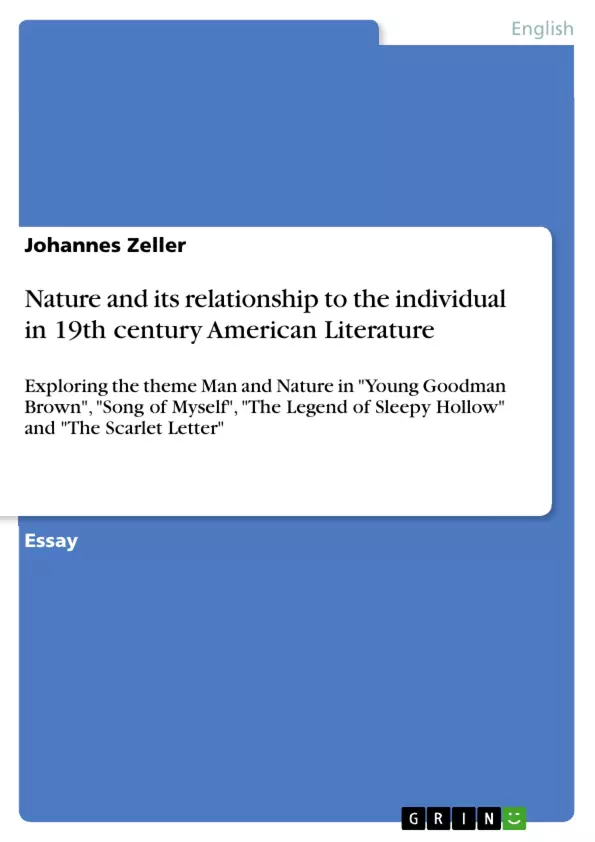Dieses Essay untersucht die Beziehung zwischen Mensch und Natur im der amerikanischen Literatur des 19. Jahrhunderts. Der Schwerpunkt liegt dabei auf den Werken von Nathaniel Hawthorne und Walt Whitman.
This essay explores the relationship between man and nature in 19th century American literature. It mainly focuses on stories by Nathaniel Hawthorne and Walt Whitman.
Inhaltsverzeichnis (Table of Contents)
- Nature and its relationship to the individual in 19th century American Literature
- Gothic Romances
- Puritan Depiction
- The Scarlet Letter
- Transcendentalism
- Walt Whitman
- Song of Myself
Zielsetzung und Themenschwerpunkte (Objectives and Key Themes)
This essay explores the portrayal of nature and the evolution of its relationship with society and the individual in 19th century American Literature. Through an analysis of Nathaniel Hawthorne and Walt Whitman's works, specifically "Young Goodman Brown" and "Song of Myself," the essay aims to illustrate a transition in this relationship during this era.- The contrast between Gothic romances and Transcendentalist poetry in their depictions of nature.
- The Puritan view of nature as an evil force that must be cultivated and controlled.
- The Transcendentalist perspective of nature as a source of beauty, inspiration, and connection to the divine.
- The role of nature as a symbol of freedom and escape from societal constraints.
- The search for a national identity in American literature.
Zusammenfassung der Kapitel (Chapter Summaries)
The essay begins by examining the Puritan perspective on nature as presented in Hawthorne's works, particularly "Young Goodman Brown." The Puritan worldview saw wild nature as inherently evil, and this view is reflected in the dark and forbidding forests that feature prominently in Hawthorne's stories. These forests are seen as places of sin and temptation, where individuals are often drawn into darkness and corruption. The essay then transitions to a discussion of Transcendentalism, focusing on Walt Whitman's "Song of Myself." Transcendentalism embraced a more optimistic view of nature, seeing it as a source of inspiration and connection to the divine. Whitman's poetry celebrates nature's beauty and its power to connect individuals to something greater than themselves. He emphasizes the interconnectedness of humanity and nature, arguing that all beings are part of a larger whole.Schlüsselwörter (Keywords)
The key themes and concepts explored in this essay include 19th century American Literature, Gothic Romances, Transcendentalism, Nature, Puritanism, Society, Individual, Freedom, Identity, and National Identity. These themes are explored through the works of Nathaniel Hawthorne and Walt Whitman, focusing on the contrasting portrayals of nature in their writings.Frequently Asked Questions
How was nature depicted in 19th-century American Gothic Romances?
In Gothic romances, such as those by Nathaniel Hawthorne, nature is often portrayed as dark, forbidding, and a place of sin or temptation.
What was the Puritan view of the wilderness?
Puritans viewed wild nature as an evil force that needed to be controlled, cultivated, and feared as a source of moral corruption.
How did Walt Whitman's view of nature differ from the Puritans?
Whitman, a Transcendentalist, saw nature as a source of beauty, inspiration, and a divine connection that links all individuals together.
What is the significance of "Song of Myself"?
In this poem, Whitman celebrates the interconnectedness of humanity and nature, moving away from societal constraints toward a sense of individual freedom.
How does "The Scarlet Letter" use nature as a symbol?
Nature in Hawthorne's work serves as a backdrop for the struggle between societal laws and individual freedom, often representing a wild space outside of human control.
- Arbeit zitieren
- Mag.phil. Johannes Zeller (Autor:in), 2012, Nature and its relationship to the individual in 19th century American Literature, München, GRIN Verlag, https://www.grin.com/document/276373



